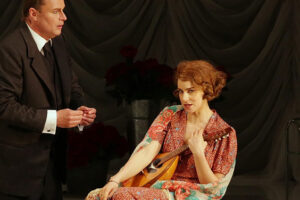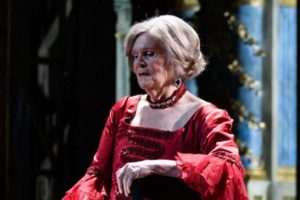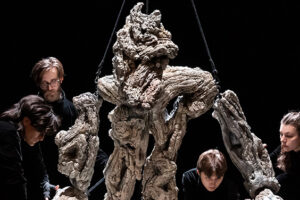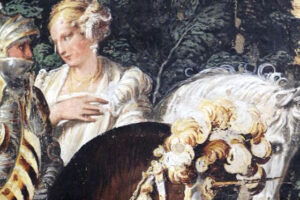
When I first watched the DVD
Hvorostovsky in Moscow with guest star Sondra Radvanosky, I was absolutely amazed at the superb quality of the singing. Consulting the accompanying notes, I found I had good reason.
Delos had earlier recorded this 2008 concert and released it on CD as Verdi Opera Scenes. Then, obtaining film footage of the concert from Russian television, Delos “collaborated with California film editor Steve Scoville, who expertly synched the footage with Delos’ concert audio. The result… takes the viewer/listener to Moscow’s Great Hall for the concert’s most unforgettable moments, with stunning ‘you are there’ sonic and visual impact.”
I found that statement thoroughly confusing, but I presume this means that we don’t know how much of the audio is from the live concert and how much had been edited for the CD release. At any rate, Mr. Scoville did a great job of the synching, and both singers sound in resplendent voice. But, is it live or is it Memorex?
The 42-minute DVD appears to be slapped together hastily and without much thought given to the final product’s quality. We begin abruptly with a woman’s voice in Russian announcing the first piece, and off we go. The camera spends a lot of time focusing on the audience between numbers as well as numerous women and girls bringing flowers to the singers.
I’m not familiar with Russian audience behavior, but the audience here appears to be equally divided between enthusiasts and people who have no clue what’s going on. Some applaud enthusiastically (the conductor Constantine Orbelian applauds every aria wildly), some manage some weak clapping, and others appear dazed and don’t applaud at all.
The concert excerpts include Hvorostovsky in the Verdi arias of Carlo from Ernani, and Rodrigo from Don Carlo plus duet scenes with Radvanovsky from Ballo (the Renato-Amelia confrontation including “Morro, ma prima in grazia” and “Eri tu”) and Il Trovatore (Act IV confrontation between Leonora and Di Luna). Inexplicably, Valentin’s aria from Faust is thrown in for good measure.
Again, all the singing is excellent. Hvorostovsky, white-maned and dressed all in black, seems entirely at home in this music and these characters. His performances here all show an gripping degree of emotional intensity that I did not expect from this usually restrained and dignified baritone. He and Radvanovsky have a terrific chemistry in the duets, and the Trovatore duet particularly has sparks flying into a steamy intensity.
Ms. Radvanovsky appears in quite flattering black and red gowns, but she really needs a hair intervention—in the Ballo scene, her tresses are a lifeless, limp clump. Happily, she has pulled it back when she returns for Trovatore.
But her singing is ravishing in both duets, her controversial “flutter” under control and her pitch spot-on. Her usually rather rudimentary acting skills are much improved, even in close-up. In this concert, she appears at the height of her considerable powers, and she lives up to the accompanying booklet’s description of her as “the reigning Queen of Verdi sopranos.”
Orbelian, conducting the Philharmonia of Russia, keeps things quite lively. There is not much nuance in the conducting or the playing, but there is plenty of Verdian sweep and power. I certainly would have liked to see more of the concert—there appears to be an on stage chorus that never sings on the DVD—but for fans of these singers and fans of Verdi, this DVD contains extraordinary vocalism in some of the master’s finest music. One can only wish that the DVD might have been produced with more finesse and skill.

























Comments